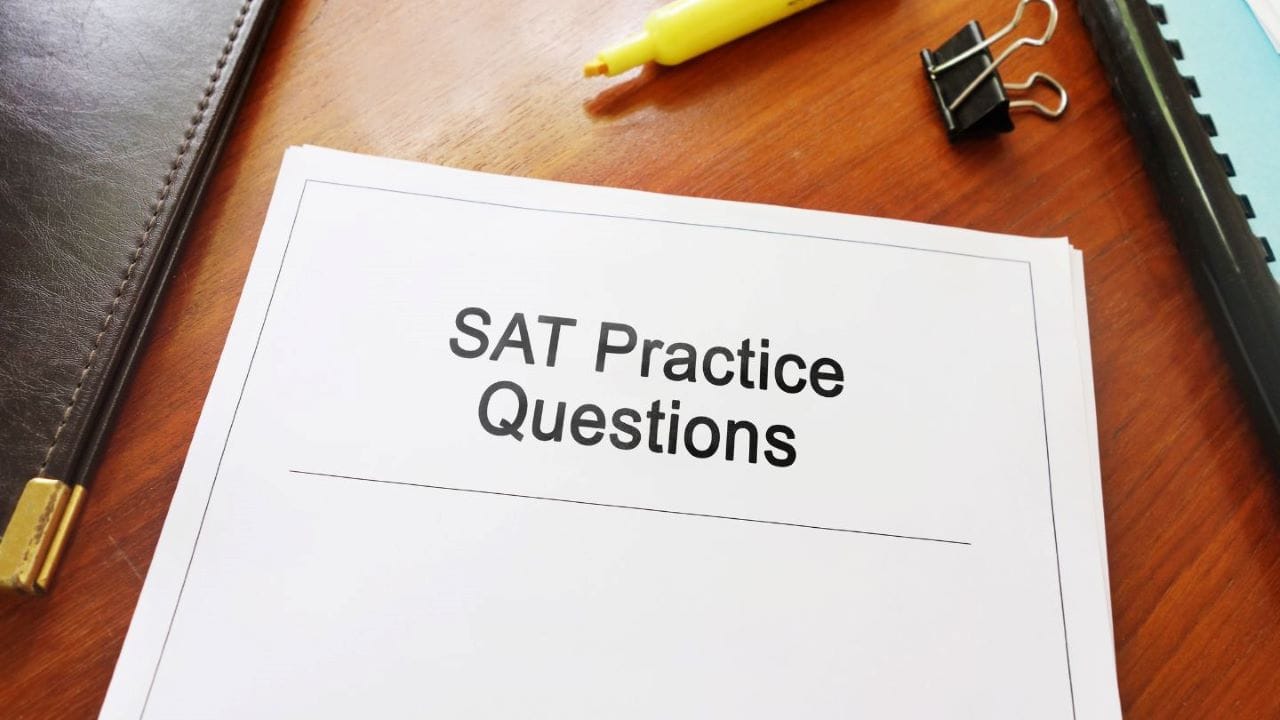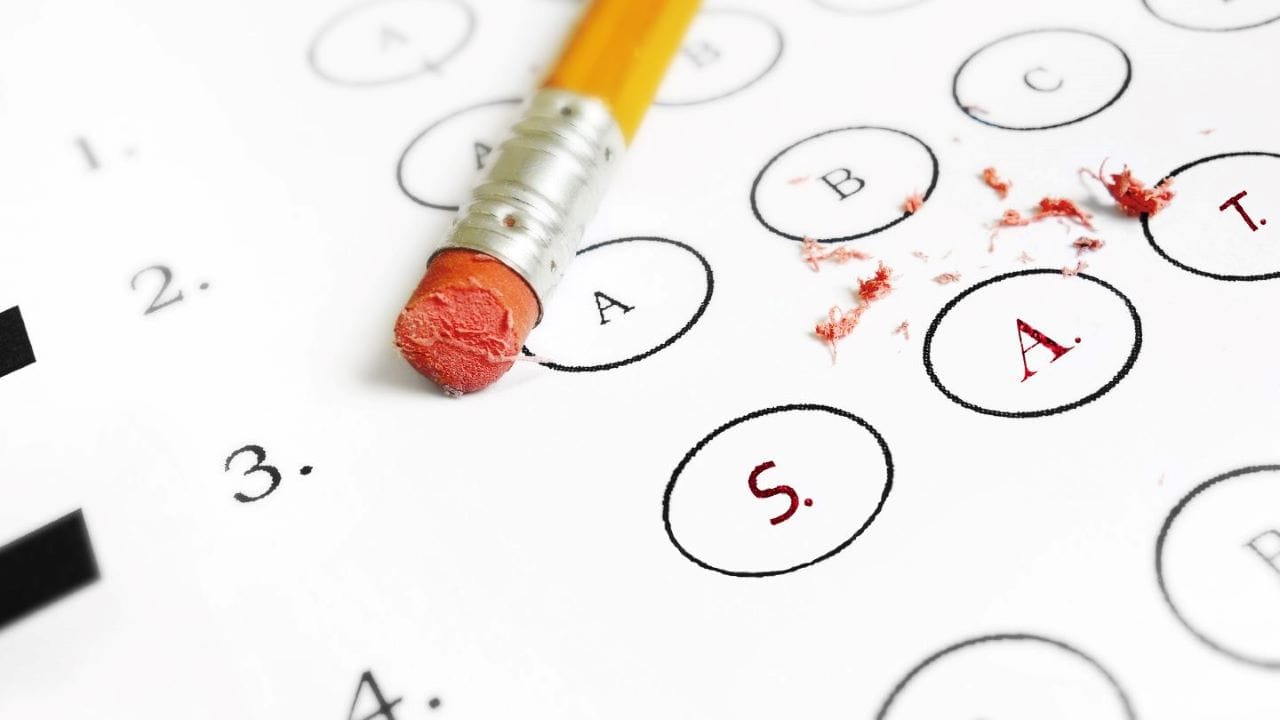What Are SAT Subject Tests?: A Comprehensive Guide

Did you know there are language tests that are also SAT Subject Tests? For high school students, the SAT is the pre-college exam known around the world. It's almost like the second you start your senior year, all parents, teachers, and guidance counselors talk about it. But what’s the purpose of SAT Subject Tests?
They offer a chance for students to showcase their knowledge and skills in specific subject areas. It's also a chance for students to prepare themselves for a future of educational challenge and excellence, and our team at Bold.org wants you to know all about it.
In this article, we go over our comprehensive guide on everything you need to know about SAT subject tests, from the basics to test preparation, and give some tips on how to study for the SATs. So, if you are or know a high school student getting ready to take the SATS, send them our way so we can share some insight and help set them up for success!
Head on over to our Scholarship Blog for more articles on SAT prep, and don't forget to create a profile to access exclusive articles and tons of scholarships to help fund your college career.

What Are SAT Subject Tests?
So, what exactly are SAT Subject Tests? SAT Subject Tests are hour-long exams that assess your proficiency in specific subjects like English, math, science, history, and foreign languages. They are typically taken by high school students who want to test their expertise in a particular subject area. And let's not forget those who are applying for college.
It's important to note that SAT Subject Tests are completely separate from the general SAT. While the general SAT measures your critical reading, writing, and math skills, SAT Subject Tests solely focus on a specific subject and your academic strengths in said subject. And before you ask, you can have more than one or two Subject Tests that you excel in.
SAT Subject Tests are designed to measure your knowledge in various subject areas. There are 20 different Subject Tests available, including Biology, Chemistry, Physics, Mathematics, Foreign Languages, and History. Each Subject Test is multiple-choice and assesses your understanding of the subject's key concepts, critical thinking skills, and problem-solving abilities.
Let's take a closer look at some of the specific SAT Subject Tests:
- Biology: This test assesses your understanding of biological concepts, including cellular and molecular biology, ecology, and genetics.
- Chemistry: This test evaluates your knowledge of chemical reactions, atomic structure, and the periodic table.
- Physics: This test measures your understanding of topics such as mechanics, electricity, magnetism, and thermodynamics.
- Mathematics: The Math Subject Tests are a little different. They are divided into two levels - Math Level 1 and Math Level 2, and they assess your knowledge of algebra, geometry, trigonometry, and precalculus.
- Foreign Language: These tests evaluate your proficiency in languages such as Spanish, French, German, Chinese, and Italian.
- History: The History Subject Tests cover various periods and regions, including U.S. History, World History, and European History.
Unlike the general SAT test, SAT Subject Tests are typically required or recommended by selective schools, and they provide students the opportunity to demonstrate their expertise in specific academic areas and potentially showcase their potential for future success in college coursework.

The Importance of SAT Subject Tests
If you're a high school student, we're sure you've questioned why the SAT is important. Aside from testing your knowledge in SAT subjects, colleges and universities often consider SAT subject exam scores as part of the admissions process.
These scores not only complement your application by showing your strengths in particular subject areas, but they can also help you stand out from other candidates. In fact, many highly selective schools strongly recommend SAT Subject Tests, especially for programs that correlate to the Subject Test of your choice.
Also, SAT Subject Tests can serve as a tool for course placement in college. That means some institutions will use these scores to determine whether you are eligible to skip introductory courses or receive credit for advanced coursework. It almost seems like an achievement test.
A high score in a specific subject can actually give you a head start on your college journey. Not only will you automatically start out with good grades, but it will also save you time and money in the long run.
Please note: some colleges require or recommend SAT Subject Tests, and many others do not. Always check the admissions requirements of the colleges you are interested in to determine if SAT Subject Tests are necessary for your application.
How SAT Subject Tests Differ from the General SAT
We know general SAT and SAT Subject Tests seem like the same thing, but they're not. While the general SAT focuses on critical reading, writing, and math skills, SAT Subject Tests are completely optional and focus on specific subject areas.
The general SAT has a broader scope and tests your overall academic readiness for college, but it doesn't make the regular SAT Subject Tests less important or valuable. It can actually work to your benefit because it allows you to show your knowledge and skills in specific subjects, making them ideal for students who excel in particular areas.
When preparing for SAT Subject Tests, it's important to review the specific content and format of each test. Practice tests and study materials can help you familiarize yourself with the types of questions you'll encounter on test day and improve your performance on test day.
Get Matched to Thousands of Scholarships
Create your Bold.org profile to access thousands of exclusive scholarships, available only on Bold.org.
Create Free ProfileSAT vs ACT
Let's take a quick moment to discuss the difference between the SAT and ACT.
The SAT and ACT are both standardized tests commonly used for college admissions in the United States. While they both serve similar purposes, they have some key differences that are worth knowing.
1. Test Structure:
- The SAT consists of two main sections: evidence-based reading and writing and math.
- The ACT includes four sections: English, Math, Reading, and Science, with an optional Writing section.
2. Scoring:
- The SAT is scored on a scale of 400-1600, with separate scores for the Reading/Writing and Math sections.
- The ACT is scored on a scale of 1-36, with an overall composite score and separate scores for each section.
Note: Both tests have optional essay sections; both are scored separately.
3. Content Emphasis:
- The SAT places a strong emphasis on vocabulary, critical reading, and problem-solving skills.
- The ACT focuses on grammar, punctuation, and scientific reasoning.
4. Time Allocation:
- The SAT allows more time per question compared to the ACT.
5. Regional Differences:
- The SAT exam is used more on the East and West coasts.
- The ACT exam is used more in the Midwest and southern regions of the United States. However, both tests are accepted by most colleges and universities nationwide.
Now, not all colleges and universities require both SAT and ACT test scores as an admissions requirement. We recommend that students research the schools they are applying to to determine whether they prefer the SAT or ACT or if they accept both. Some students may choose to take both tests to see which one they perform better on, but the decision to take the SAT and ACT, or both, should be based on preferences, goals, and the requirements of the colleges being considered.
Learn how many times you can take the SAT in case the first time around isn’t your best shot!

How to Choose the Right SAT Subject Test
When it comes to choosing the right SAT Subject Tests, there are several factors to consider. First, it's important to think about your academic strengths and interests, as well as future college plans.
Ask yourself questions like, "What subject do I thrive in?" "What field can I succeed in?" "Does my school support my chosen field?" This way, you can make an informed decision that will showcase your abilities and align with your goals.
Also, you should reflect on the areas in which you excel and feel confident in. These subjects may be good starting points for selecting your SAT Subject Tests. By choosing tests that align with your areas of academic expertise, you can maximize your chances of achieving high scores and impressing college admissions officers.
Along with your strongest subjects, think about the subjects you enjoy the most. Passion and interest can play a significant role in your motivation and performance on the tests.
When you genuinely enjoy a subject, studying and preparing for the test can feel less like a chore and more like a moment to sharpen your knowledge. So, take a moment to reflect on the subjects that truly captivate your curiosity and ignite your enthusiasm.

Available SAT Subject Tests
These tests cover a wide range of subjects, allowing you to demonstrate your knowledge and skills in various academic areas. Some of the available SAT Subject Tests include:
1. Mathematics Level 1 and Level 2: These tests assess your mathematical abilities, covering topics such as algebra, geometry, and trigonometry. If you excel in math and plan to pursue a math-related field, these tests may be a good fit for you.
2. Biology: This test evaluates your understanding of biological concepts and principles. It covers topics such as cellular and molecular biology, ecology, genetics, and evolution. If you have a passion for life sciences or even medicine, this field is for you. Just be sure to check if there are any biology Subject Test requirements for your admissions.
3. Chemistry: The chemistry test measures your knowledge of chemical concepts and principles. It covers topics such as atomic structure, chemical reactions, stoichiometry, and thermodynamics.
4. Physics: This test assesses your understanding of physics concepts and principles, covering topics such as mechanics, electricity and magnetism, waves, and optics.
5. Literature: The literature test evaluates your ability to analyze and interpret literary texts. It assesses your understanding of various literary genres, authors, and literary devices. If you have a love for literature and enjoy analyzing written works, this test is the perfect fit for you.
6. U.S. History: This test measures your knowledge of U.S. history, including political, economic, social, and cultural aspects. It covers topics from early colonization to the present day.
Of course, these subjects are just a few examples of available SAT Subject Tests. It's important to explore the full range of options and select tests that align with your interests and college goals. By doing thorough research, you can make an informed decision that will enhance your college applications and showcase your academic abilities.
Benefits of SAT Subject Tests
As a high schooler, you might be wondering what the point is. With your plate full of homework, applications, and exams, it's easy to lose sight of what it's all for, and we definitely don't want that. Here are several benefits to taking SAT Subject Tests:
- Demonstrate subject proficiency
- Showcase your knowledge and skills in specific subject areas
- Leave a long-lasting impression on the admissions committee
- Demonstrate your expertise in a particular subject
- Stay ahead of the game
- Highlight academic strengths
- Enhance your college applications and increase your chances of being admitted to your preferred college or university.
- Demonstrate genuine interest in a field of study
- Prepares you for what college exams may look like
- Keep your mind sharp
Please note: benefits of SAT Subject Tests may vary depending on the specific college or university and their requirements. Be sure to research the admission policies of your chosen schools to determine the significance of these tests in their application process.

Tips on How to Study for the SAT Subject Tests
Trust us when we say we know how taxing studying can be for high schoolers, but studying for the SAT is a different ball game. It requires a strategic approach and extreme focus. So, if you're worried about time or where to start, we've got you covered!
Here are some tips to help you study effectively:
- Understanding the test format is key. Familiarize yourself with the structure and content of the SAT. Understand the sections (Reading, Writing and Language, Math) and the types of questions that will be on the test. This will help you create your study plan.
- Create a study schedule and stick to it! The key word here is discipline, and if you follow a study schedule that fits within your school/life balance, you will only be that much more prepared for test day.
- Utilize available official study materials. The College Board usually provides official study materials, including practice tests and sample questions. These resources are valuable for understanding the test format and practicing with authentic questions.
- Practice regularly. Practice is key to improving your SAT performance. Solve practice questions and complete full-length practice tests to build familiarity with the test format, improve time management, and enhance your problem-solving skills.
- Review mistakes: Go over your mistakes and review the explanations for correct answers. This review will help you with areas that require more focus.
- Seek additional resources: Consider using other study resources like prep books, online courses, or tutoring services to further the study prep.
- Focus on test-taking strategies: Familiarize yourself with effective test-taking strategies, such as time management, process of elimination, and educated guessing. These strategies can help you approach questions more efficiently and increase your chances of answering correctly.
- Take care of yourself: Although we want you to succeed, don't forget to take care of yourself. Get ample amounts of rest, exercise, and maintain a healthy diet during your SAT preparation.
- Take practice tests: Yes, we admit, but taking practice tests under test-like timed conditions will help you build endurance, manage time more effectively, and get used to the test environment.
Whatever your study plan looks like, remember that consistency and focus are the keys to success on the SAT. Follow these tips or customize them to match your study approach, and see how far it'll take you. The goal is to strengthen your academic weaknesses so you can improve your performance and feel more confident on test day.

Frequently Asked Questions About SAT Subject Tests
What can you get out of taking an SAT Subject Test?
Aside from a good test score, taking an SAT Subject Test can leave you feeling accomplished and ready to take the general SAT test. It's important to keep your mind sharp in certain subjects to ensure you're knowledgeable and prepared to take on the challenge of the general SAT.
How can you prepare for SAT Subject Tests?
You can prepare for the SAT Subject Test by creating a study plan and sticking to it. Though studying can be tedious, don't underestimate the benefits of a good study schedule for big exams like the SATs. We recommend designing a study plan that fits into your school/life balance so you don't overwhelm your workload and burn yourself out.
Are SAT Subject Test scores important?
If you want to excel on your SAT and remain on top of your game, then yes. Though they aren't an admissions requirement for all colleges and universities, the SAT Subject Test scores can only benefit you in the long run. Not only do they give you an idea of where you are on a grade scale, but they also show you areas you may need help in.
If you're a high schooler getting ready to take the SATs, head over to our Scholarship Blog to learn how you can prepare for the big day. And don't forget to create a profile to get exclusive access to our Bold scholarships.